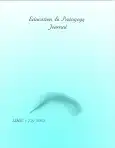THE DIGITAL ENVIRONMENT IN THE FIELD OF TEACHING CLASSIC RUSSIAN LITERATURE
- Authors: Domansky V.A.1, Mironova N.A.2, Popova N.A.2
-
Affiliations:
- St. Petersburg Military Order of Zhukov Institute of the National Guard Troops of the Russian Federation
- Moscow State Pedagogical University
- Issue: No 1 (2023)
- Pages: 5-24
- Section: Articles
- URL: https://bakhtiniada.ru/2782-2575/article/view/270208
- DOI: https://doi.org/10.23951/2782-2575-2023-1-5-24
- ID: 270208
Cite item
Full Text
Abstract
The works of the Russian classics form the basis for teaching literature in schools and universities. One of the most important methodological skills that a master’s student of a pedagogical university is the search for techniques and technologies for teaching classic Russian literature for later professional activity. The following research methods are presented: Interviewing master’s students studying at a pedagogical university, content analysis, qualitative and quantitative generalization of the obtained results, prediction of the main directions of work at the stage of identification, design, and control of experiments.The research was conducted among the master’s students in the 2nd year of the Institute of Philology of Moscow State Pedagogical University (Russian Federation). A total of 45 students participated in the experimental part from September 2019 to February 2020. The study results were also discussed in the advanced training courses for teachers at the St. Petersburg Institute of Business and Innovation.The necessity of using digital technologies and organizing a dialog with contemporary literature in studying classic Russian literature is empirically demonstrated.As a result, a classification of digital technologies was created, and the main areas of work related to the inclusion of modern literature in studying Russian classics were identified.
About the authors
Valeriy Andreyevich Domansky
St. Petersburg Military Order of Zhukov Institute of the National Guard Troops of the Russian Federation
Author for correspondence.
Email: valerii_domanski@mail.ru
Saint Petersburg, Russian Federation
Nataliya Aleksandrovna Mironova
Moscow State Pedagogical University
Email: na.mironova@mpgu.edu
Moscow, Russian Federation
Nataliya Alekseyevna Popova
Moscow State Pedagogical University
Email: na.popova@mpgu.edu
Moscow, Russian Federation
References
- Portnova, T. (2017). Genre art system: Experience of a comparative analysis of theatre (ballet, opera) and pictorial arts”. Il Ponte, 73/8. doi: 10.21506/j.ponte.2017.8.47
- Chertov, V.F., & Trubina, L.A. (2012). Russian classics as the basis of school literary education. Teacher XXI century. 1/4: 174–183. (In Russian). Google Scholar
- Domanskii, V.A., Mironova, N.A., Gorskikh, O.V., & Popova, N.A. (2020). Russian classics in literary education: reality and monitoring of opportunities. Bulletin of the St. Petersburg State University of Technology and Design. Series 3: Economic, Humanities and Social Sciences. 3: 82–93. (In Russian). doi: 10.46418/2079–8210_2020_3_14
- Ivanova, N., & Sorokina, T. (2019). Educational environment approach to preventing the growth of school students anxiety in the transition from primary to secondary school. Elementary Education Online. 19/1: 333–342. https://www.doi.org/10.17051/ilkonline.2020.661841
- Law, N., Woo, D., de la Torre, J., & Wong, G. (2018). A global framework of reference on digital literacy skills for indicator 4.4. 2. UNESCO Institute for Statistics (UIS/2018/ICT/IP/51). Google Scholar
- Aristova, M.A., Strizhekurova, Z.I., & Mironova, N.A. (2018). The relationship of literary and cultural functional literacy of the modern pupil. International Conference ‟Education Environment for the Information Ageˮ. The European Proceedings of Social & Behavioural Sciences. https://dx.doi.org/10.15405/epsbs.2018.09.02.7
- Kasyanuk, T.N. (2004). Sociocultural potential of literature in the process of modernization of general education. Dissertation. Google Scholar
- Vodolazkin, E.G. (2019). Aviator. Moscow: Publishing house AST: Edition of Elena Shubina. (In Russian). Google Scholar
- Zaitsev, P. (2021). Lavra for ‟Lavra.ˮ Russian newspaper. Federal issue No. 44 (7802). (In Russian). Retrieved from: https://rg.ru/2019/02/27/laureatom-premii-aleksandra-solzhenicyna-stal-evgenij-vodolazkin.html
- Popova, N.A., & Soldatkina, Ya.V. (2018). Vodolazkin, E. II International Scientific Conference "Iconic Names of Russian Literatureˮ. Krakov: Znamia, no. 10.
- Skotnitskaya, A., & Svezhego, J. (2019). Iconic names of modern Russian literature: Vodolazkin E. Collective monograph. Krakow.
- Popova, N.A., & Soldatkina, Ya.V. (2017). ‟Not a New Age Manˮ: a lesson-seminar based on the novel by E.G. Vodolazkina ‟Aviator.ˮ XI form. Literature at school. 11: 26–29. (In Russian). Google Scholar
- Vodolazkin, E.G. (2019). Aviator. Moscow: Publishing house AST: Edition of Elena Shubina. (In Russian). Google Scholar
- Gogol, N.V. (2000) Stories. Dead Souls. Moscow: Olympus; LLC “Publishing house AST”. (In Russian).
- Vodolazkin, E.G. (2019). Aviator. Moscow: Publishing house AST: Edition of Elena Shubina. (In Russian). Google Scholar
- Vodolazkin, E.G. (2020). Books of my life. Libraries of bright people. (In Russian). Retrieved from: http://knigalife.com/person/pisateli/evgeniy-vodolazkin/?sphrase_id=39 66
- Soldatkina, Ya.V. (2017). Dialogue with Russian literature of the XX century in the novels of Evgeny Vodolazkin ‟Laurelˮ and “Aviator”. Iconic names of modern Russian literature: Evgeny Vodolazkin. Ed. A. Skotnitskaya and J. Svezhego. (In Russian).
- Portnova, T. (2015). The Giants Against the Gods": the Dramatic and Plastic Explication of the Pergamon Alrar. Contemplation of the Exhibit at the Pushkin State Museum of Fine Arts. 2015. 1st International Conference on Arts, Design and Contemporary Education, ICADCE 2015. Atlantic Press, 236–239.
- Mironova, N.A. (2020). Digital learning technologies in the context of lifelong literary education. Moscow: Publishing house ‟Econ-informˮ. (In Russian). Google Scholar
- Getmanskaya, E.V., Mironova, N.A., & Popova, N.A. (2015). Literary Education in Russia: Problems and Trends. Mediterranean Journal of Social Sciences. 6/6 S1: 170–177. Google Scholar
- Ivanova, N., & Sorokina, T. (2019). Educational environment approach to preventing the growth of school students anxiety in the transition from primary to secondary school. Elementary Education Online, 19/1: 333–342. https://www.doi.org/10.17051/ilkonline.2020.661841
- Ivanova, N., & Sorokina, T. (2020). The relationship between the categories “Educational environment” and “Educational space” in Russian psychological and pedagogical science. Revista Inclusiones, 7 (Esp.): 100–118. Google Scholar
- OECD (2017). Digital Economy Outlook. Retrieved 28 February, 2021 from https://read.oecd-ilibrary.org/science-and-technology/oecd-digital-economy-outlook2017_978926 4276284-en#.WeCTLWi0OUk#page1
- Portnova, T. (2017). Author’s educational program “Training of innovative project activities” and conditions of its inclusion in the system of retraining of stage directors. 2017 International Conference on Management, Education and Social Science. (2017). https://doi.org/10.2991/icmess-17.2017.122
Supplementary files






